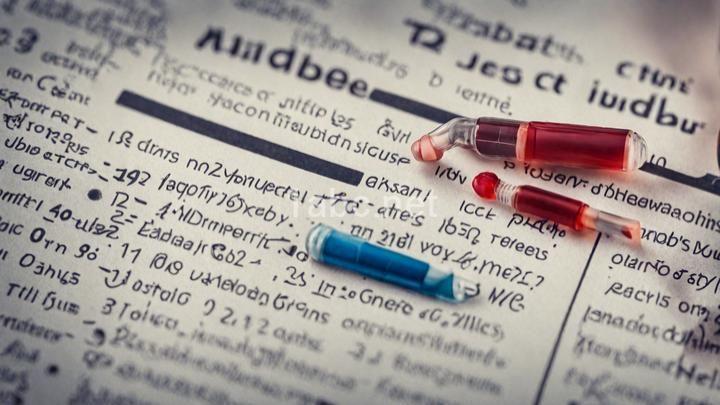The Power of Mindfulness: Techniques to Reduce Diabetes-related Anxiety

Introduction:
Welcome to the world of mindfulness, where we explore the incredible benefits it holds for reducing anxiety in individuals with diabetes. Living with diabetes can be challenging, and managing anxiety related to this condition is crucial for overall well-being. In this blog post, we will delve into the concept of mindfulness and discover how it can become a powerful tool in your anxiety-reduction repertoire. So, grab a cup of tea and let's embark on this journey of mindfulness together!
Section 1: Understanding Diabetes-related Anxiety
Living with diabetes brings with it a unique set of challenges. Diabetes-related anxiety refers to the worry, stress, and fear associated with managing this condition. It can stem from various triggers, such as concerns about blood sugar levels, fear of complications, or the daily demands of diabetes management. The impact of anxiety on overall well-being cannot be underestimated, as it can lead to increased blood sugar levels, difficulty in adhering to treatment plans, and even hinder the ability to cope with the demands of everyday life.
Section 2: The Benefits of Mindfulness for Anxiety Reduction
Now, let's turn our attention to mindfulness and its incredible potential for reducing anxiety in individuals with diabetes. Mindfulness is the practice of being fully present in the current moment, without judgment. It involves directing our attention to our thoughts, emotions, and sensations with a sense of curiosity and acceptance. Research studies have shown that mindfulness can have a profound impact on anxiety reduction, not only in individuals with diabetes but also in the general population. By cultivating mindfulness, we can improve our mental health and overall quality of life.
Section 3: Mindfulness Techniques to Reduce Diabetes-related Anxiety
In this section, we will explore various mindfulness techniques that you can incorporate into your daily life to reduce diabetes-related anxiety.
Deep Breathing Exercises:
One of the simplest yet most effective mindfulness techniques is deep breathing. Deep breathing exercises help activate the body's relaxation response, reducing stress and anxiety. To practice deep breathing, find a comfortable position, close your eyes, and take slow, deep breaths. Inhale deeply through your nose, allowing your abdomen to rise, and exhale slowly through your mouth, letting go of any tension or worries.
Body Scan Meditation:
Body scan meditation is a practice that involves bringing awareness to different areas of your body, noticing any physical sensations or emotions that arise. This technique helps us become more attuned to our bodies and develop a deeper understanding of how anxiety manifests physically. To practice body scan meditation, find a quiet space, lie down or sit comfortably, and slowly scan your body from head to toe, paying attention to any sensations or areas of tension. As you become more aware of these sensations, gently release any tension and allow your body to relax.
Mindful Eating:
The connection between food, emotions, and anxiety in individuals with diabetes is undeniable. Mindful eating can help us develop a healthier relationship with food and manage anxiety related to our dietary choices. When practicing mindful eating, take the time to fully engage your senses while eating. Notice the colors, smells, textures, and flavors of your food. Chew slowly and savor each bite, paying attention to your body's cues of hunger and fullness. By being present and mindful during meals, we can reduce anxiety and make more conscious choices that support our well-being.
Section 4: Integrating Mindfulness into Daily Life
Now that we have explored various mindfulness techniques, let's discuss how to integrate mindfulness into your daily life, specifically addressing stressors related to diabetes management.
First and foremost, it's important to set aside dedicated time each day to practice mindfulness. Whether it's in the morning, during lunch breaks, or before bed, find a time that works best for you and commit to it. You can start with just a few minutes and gradually increase the duration as you become more comfortable.
In addition to dedicated practice, mindfulness can be woven into your everyday activities. For example, when you're washing dishes, focus on the sensation of the water, the sound of the dishes clinking, and the warmth of your hands. When you're walking, pay attention to the sensation of your feet hitting the ground and the sounds around you. By bringing mindfulness to these simple tasks, you can cultivate a sense of calm and presence throughout the day.
Lastly, seek out resources that can support your mindfulness journey. There are numerous apps, books, and online communities available that provide guidance, meditation practices, and a supportive community to connect with. These resources can offer additional tools and inspiration as you incorporate mindfulness into your daily life.
Conclusion:
Managing anxiety related to diabetes is a crucial aspect of overall well-being. By incorporating mindfulness into your life, you can reduce anxiety, improve mental health, and enhance your quality of life. Remember, mindfulness is a journey, and it takes time and practice to fully integrate it into your daily routine. So, take it one breath at a time, one moment at a time, and start experiencing the power of mindfulness in reducing diabetes-related anxiety. You've got this!
FREQUENTLY ASKED QUESTIONS
What is mindfulness and how can it help with diabetes-related anxiety?
Mindfulness is a practice that involves being fully present and aware of the present moment, without judgment. It is about paying attention to our thoughts, feelings, and sensations in a non-reactive manner. When it comes to diabetes-related anxiety, mindfulness can be a helpful tool. Living with diabetes can be challenging and stressful, and anxiety is a common emotional response to managing this condition. However, mindfulness can offer several benefits in managing diabetes-related anxiety.
Firstly, mindfulness can help individuals become more aware of their anxiety symptoms. By practicing mindfulness, individuals can learn to recognize the physical sensations, thoughts, and emotions associated with anxiety. This awareness allows them to respond to anxiety in a more constructive and proactive way.
Secondly, mindfulness helps individuals cultivate a sense of acceptance and non-judgment towards their anxiety. Rather than trying to suppress or avoid feelings of anxiety, mindfulness encourages individuals to acknowledge and observe their anxiety without judging it as good or bad. This acceptance can reduce the resistance and struggle often associated with anxiety, ultimately leading to a decrease in overall anxiety levels.
Moreover, mindfulness can help individuals develop a better understanding of the thoughts and beliefs that contribute to their anxiety. By observing their thoughts with curiosity and non-attachment, individuals can begin to challenge and reframe negative thought patterns that fuel anxiety. This cognitive shift can lead to a reduction in anxiety symptoms and a more positive mindset.
In addition, mindfulness practices such as deep breathing exercises or body scans can help individuals relax and reduce stress levels. These techniques activate the relaxation response in the body, which counteracts the physiological effects of anxiety. Regular practice of mindfulness can improve emotional well-being and overall quality of life for individuals with diabetes-related anxiety.
It is important to note that while mindfulness can be a helpful tool, it should not replace professional medical advice or treatment for anxiety. It is always recommended to consult with a healthcare professional who specializes in diabetes management and mental health to develop a comprehensive approach to managing diabetes-related anxiety.
How can mindfulness techniques specifically help individuals with diabetes?
Mindfulness techniques can be particularly beneficial for individuals with diabetes. By practicing mindfulness, individuals can develop a heightened awareness of their thoughts, emotions, and bodily sensations, which can help them better manage their condition.One way mindfulness can assist individuals with diabetes is by reducing stress levels. Stress can have a negative impact on blood sugar levels, making it more challenging to keep them stable. Mindfulness techniques, such as deep breathing exercises and meditation, can help individuals relax and decrease their stress levels, which in turn can lead to improved blood sugar control.
Additionally, mindfulness can enhance self-care practices for individuals with diabetes. By being fully present in the moment, individuals can pay closer attention to their daily routines, such as monitoring their blood sugar levels, taking medication, and making healthy food choices. This increased awareness can lead to better adherence to diabetes management strategies and ultimately improve overall health outcomes.
Mindfulness can also help individuals with diabetes develop a healthier relationship with food. By practicing mindful eating, individuals can slow down and savor each bite, paying attention to hunger and fullness cues. This can prevent overeating and promote healthier food choices, which is crucial for managing blood sugar levels.
Furthermore, mindfulness techniques can support individuals in coping with the emotional challenges that often accompany diabetes. Living with a chronic condition can be stressful and may lead to feelings of anxiety, depression, or frustration. Mindfulness can provide individuals with tools to acknowledge and accept these emotions without judgment, fostering emotional well-being and resilience.
Overall, incorporating mindfulness techniques into the daily routine of individuals with diabetes can have a positive impact on their physical and emotional well-being. By reducing stress, enhancing self-care practices, promoting mindful eating, and supporting emotional health, mindfulness techniques can play a vital role in helping individuals effectively manage their diabetes.
Are there specific mindfulness techniques that are beneficial for individuals with diabetes?
Yes, there are specific mindfulness techniques that can be beneficial for individuals with diabetes. Mindfulness is the practice of being fully present and aware of the present moment, without judgment. It can help individuals with diabetes manage their condition by reducing stress, improving blood sugar control, and promoting overall well-being.One technique that can be helpful is mindful eating. This involves paying attention to the sensations of eating, such as the taste, texture, and smell of food. By eating mindfully, individuals with diabetes can become more attuned to their body's hunger and fullness cues, making it easier to make healthier food choices and maintain stable blood sugar levels.
Another technique is mindful breathing. This involves focusing on the breath and observing it without trying to change it. By practicing mindful breathing, individuals with diabetes can calm their mind, reduce stress, and lower blood pressure. This technique can be particularly useful during moments of high stress or when blood sugar levels are fluctuating.
Body scan meditation is another mindfulness technique that can benefit individuals with diabetes. It involves systematically scanning the body and bringing awareness to any sensations or areas of tension. By practicing body scan meditation, individuals can develop a greater sense of body awareness and become more attuned to any physical symptoms or changes related to their diabetes.
In addition to these techniques, regular mindfulness meditation can also be beneficial for individuals with diabetes. By setting aside dedicated time each day to cultivate mindfulness, individuals can improve their ability to manage stress, regulate emotions, and maintain a positive mindset, all of which can contribute to better diabetes management.
It's important to note that while mindfulness techniques can be helpful for individuals with diabetes, they should not replace medical treatment or advice from healthcare professionals. It's always best to consult with a healthcare provider before making any changes to your diabetes management plan.
Can mindfulness completely eliminate diabetes-related anxiety?
Mindfulness can be a helpful tool in managing and reducing diabetes-related anxiety, but it may not completely eliminate it. Diabetes-related anxiety is a common experience for many individuals living with diabetes, as it can be overwhelming to constantly monitor blood sugar levels, manage medications, and make lifestyle adjustments. Mindfulness, which involves being fully present and non-judgmentally aware of one's thoughts, feelings, and bodily sensations, can provide a sense of calm and help individuals cope with anxiety.By practicing mindfulness, individuals can develop a greater awareness of their anxiety triggers and learn to respond to them in a more balanced and compassionate way. This can lead to a reduction in anxiety symptoms and an improved sense of well-being. Mindfulness techniques, such as deep breathing exercises, body scans, and guided imagery, can also help individuals relax and alleviate physical symptoms of anxiety, such as rapid heartbeat and shallow breathing.
However, it is important to note that mindfulness is not a magic cure-all and may not completely eliminate diabetes-related anxiety. Every individual's experience with anxiety is unique, and what works for one person may not work for another. It is important to approach mindfulness as one tool in a comprehensive approach to managing anxiety, which may also include therapy, medication, and other self-care practices.
If you are experiencing diabetes-related anxiety, it is recommended to consult with a healthcare professional who can provide personalized guidance and support. They can help you develop a tailored plan that addresses your specific needs and concerns. Remember, managing anxiety is a journey, and it takes time and effort to find what works best for you.




